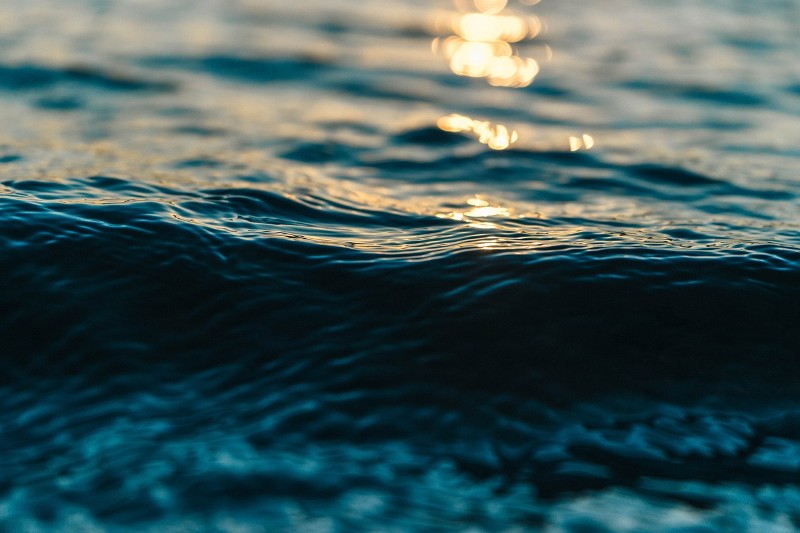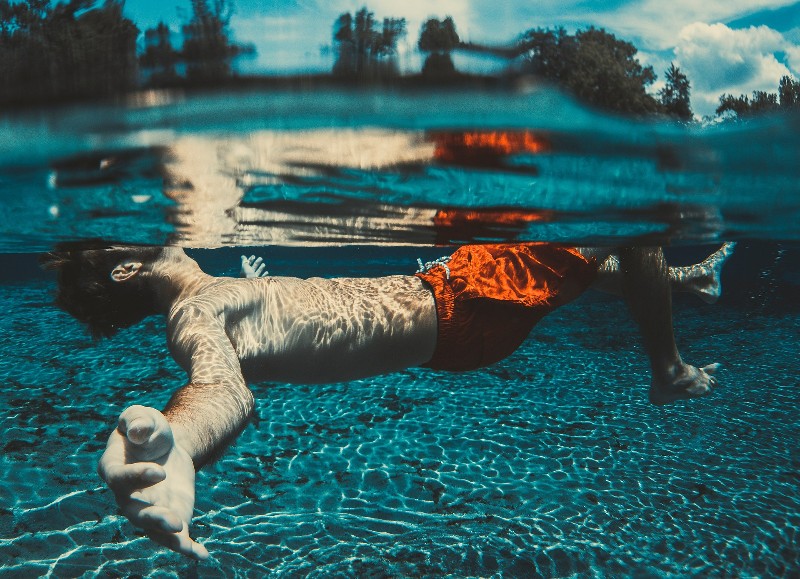Ever visited the beach, enjoyed a dip in the ocean, and realized your hair feels like it’s healthy and has more volume than usual?
Or are you the opposite? Have you noticed more tangles than usual and hair that feels heavy and quite dry?
There’s a lot of debate about the benefits or risks associated with salt water on hair, but the truth is that salt water can be both good and bad for your hair. It depends on a number of factors.
So is salt water good for your hair? Let’s take a look, so that you can be prepared for your next sea swim.

Is salt water good for your hair?
With the right preparation and care, salt water can be very beneficial to your hair. The salt is exfoliating, which can help to clean your scalp, while the salt crystals cling to hair to add volume and body.
There are other potential benefits that salt water can provide to your hair too. The full list of pros for swimming or washing your hair in salt water are:
- Added volume from the salt crystals, particularly with curls
- Nutrients including magnesium, selenium, and potassium which are beneficial to hair health
- Potentially improved hair growth due to exfoliation and increased blood flow
- Anti-fungal properties due to the drying effect
- Acts as a natural shampoo, removing excess oils
However, that doesn’t mean that you should stop washing your hair with fresh water and seek to only clean it using salt water.
Salt water has some drawbacks too, and left in your hair for too long, it can actually be a bad thing.
Cons of using salt water in your hair
Salt is an effective dehydrator. You know how you’re told to never drink seawater since it actually makes you more thirsty? It has a similar impact on your hair.
It removes moisture, which is why salt water can be good for anyone with dandruff – the antifungal effect is because it dries the scalp and makes it less habitable for the fungal bacteria which cause dandruff in the first place.
Yet too much salt water dries out the hair completely, leaving it brittle and at risk of damage. It can also dry out the scalp, causing irritation.
Salt water can be good for your hair, but in moderation, and only when properly cleaned out.
Is rinsing hair with salt water good?
It is not a good idea to rinse your hair with salt water unless you plan on washing it with shampoo and fresh water afterward. Using salt water as a rinse can leave the salt crystals in the hair, which will dry it out too much.
Washing your hair with salt water in general can act as a shampoo in itself. It’s really good at stripping out the excess oils and dirt that need to be cleaned from your head. If you tend to have greasy hair, salt water can have a great effect on it.
But then you’ll need to wash it afterwards with fresh water to make sure you get the salt out of the hair. Otherwise, you risk damaging it.
Does salt water help with hair growth?
Salt water can promote healthy hair growth, but it is not a miracle substance. It won’t cause patchy hair to regrow, but through the nutrients it provides and the exfoliation it causes, it can keep your existing hair growing healthily.
Sorry to be the bearer of bad news if you were hoping for salt water to be the treatment you needed for hair loss. Swimming in the ocean is not going to cause your thinning hair to suddenly sprout anew.

But it can help with existing hair growth. The nutrients in salt water are beneficial to the cells in your hair and scalp.
It’s not going to cause your hair to grow inches overnight, but it will ensure your hair is strong and growing at a reasonably, regular rate.
How long should I put my hair in salt water?
You’ll get the benefits of salt water in your hair if you wash with it for just five minutes. If you’re swimming in the ocean you can manage fine for longer, provided you are able to wash your hair with fresh water within an hour or two of finishing your swim.
A lot of people wash their hair with salt water at home, because they want the benefits they provide but they don’t live close enough to the coast, or it’s too cold to go for a swim. A fair reason!
How to get the benefits of salt water at home
You can make your own saltwater wash at home, and it only takes five minutes to get the essential nutrients into your hair and to give it a thorough clean.
As long as you then wash out the salt thoroughly, you should get all the benefits with none of the downsides.
Alternatively, you can buy salt water sprays for your hair, which have all the benefits for your hair with none of the downsides:
Pete & Pedro Natural Sea Salt Spray for Hair

- As seen on Shark Tank
- Adds incredible volume & texture
- Keep hair healthy & hydrated
- No dryness
- Paraben-free
- Perfect for men & women, ideal for all hair types & lengths
If you’re sticking with the old-fashioned technique of swimming in salt water, there’s an aftercare routine you should be aware of:
Should I shampoo after salt water?
It’s a good idea to use shampoo after you’ve washed your hair with salt water, but you must use conditioner afterward too. Fresh water will likely be enough to rinse out the remaining salt crystals, but shampoo can just ensure the hair is completely cleaned.
Salt water acts as a shampoo anyway, so you don’t need to use shampoo to actually wash your hair. All of the excess oils and dirt will be cleaned out with the salt water.
Using shampoo afterward shouldn’t have a detrimental effect, but you’ll want to use conditioner to make sure you add some layer of protection back into your hair.
Stream2Sea Leave-In Conditioner

- Restores hair following salt water exposure
- Detangles and conditions hair
- Light and non-greasy
- Additional UV protection for colored hair
- Biodegradable – safe for our oceans
- Paraben & sulfate-free
If you don’t clean your hair thoroughly after using salt water, it’s going to dry out and become brittle. Using a conditioner will just make sure to add enough moisture back into your hair too, preventing it from becoming brittle.
What should I put in my hair before salt water?
For most people, it’s advised to add conditioner or oils to your hair before swimming or washing in salt water. This will protect your scalp and hair from excessive drying out. If your hair is naturally greasy, you shouldn’t need to pre-treat your hair before using salt water, but you should still wash it afterward.
Salt water is potent, and will do a great job of removing the naturally-occurring oils from your hair, which you may not want it to do. Completely stripping the hair of these oils will have a negative impact, and could damage your hair over time.
So add an extra layer of protection before you swim, and you should be fine. It’s only people with hair that is normally quite slick and produces too much oil that can enjoy salt water without adding extra conditioner first.
Still, even greasy hair will be washed clean in salt water, so while it’ll have a positive effect, you should still rinse it afterward to remove the salt and stop it from doing too much damage.
How often should I wash my hair with salt water?
If you want to enjoy the beneficial nutrients and exfoliation of salt water, it’s recommended to wash your hair using it once a month. You won’t get the same advantages by washing more regularly, and you risk damaging your hair if you do.
Washing with salt water can be done at home. A lot of people mix a teaspoon of regular salt into their shampoo and then wash their hair with it, leaving it for five minutes before rinsing it out.
This will add extra nutrients to your hair, and it will help to promote healthy hair growth with the exfoliation of the pores on your scalp. Just remember to wash it afterward.
If you wash your hair more frequently, you might think it’s beneficial since you’ll probably add volume to your hair each time. Just remember this is only a cosmetic gain, and the actual useful reasons to wash with salt water can be achieved just once a month.
How do you take care of your hair after salt water?
Once you’ve washed your hair with salt water, or swam in the ocean, you should rinse it thoroughly with fresh water and a small amount of shampoo, before using conditioner or hair oils to protect your hair.
By washing out the salt crystals you aren’t washing out the nutrients – those are absorbed relatively quickly. But you do prevent the dehydrating effect which can turn your hair brittle.
Summary
Simply, salt water is beneficial for your hair in small doses, but the longer you leave it in your hair, the higher the risk you have of damaging it. You’ll get the maximum benefit of salt water within a few minutes, so washing it out as soon afterward as possible is the best advice.
It’s worth trying a salt water wash every month, to see how it impacts your hair. You might not notice anything immediately, but you should be adding in useful vitamins and helping to keep your scalp healthy.
Alternatively, you can get all the benefits with no downside by using a natural sea salt spray, which can be used as often as you’d like:
Pete & Pedro Natural Sea Salt Spray for Hair

- As seen on Shark Tank
- Adds incredible volume & texture
- Keep hair healthy & hydrated
- No dryness
- Paraben-free
- Perfect for men & women, ideal for all hair types & lengths
If you’re lucky enough to still have a full head of hair and you’re want to keep it healthy, here’s another article you might be interested in: Is Head & Shoulders Bad For Your Hair
And if you’re interested in more hair science, here’s the answer to the question ‘Does Hair Decompose?‘

